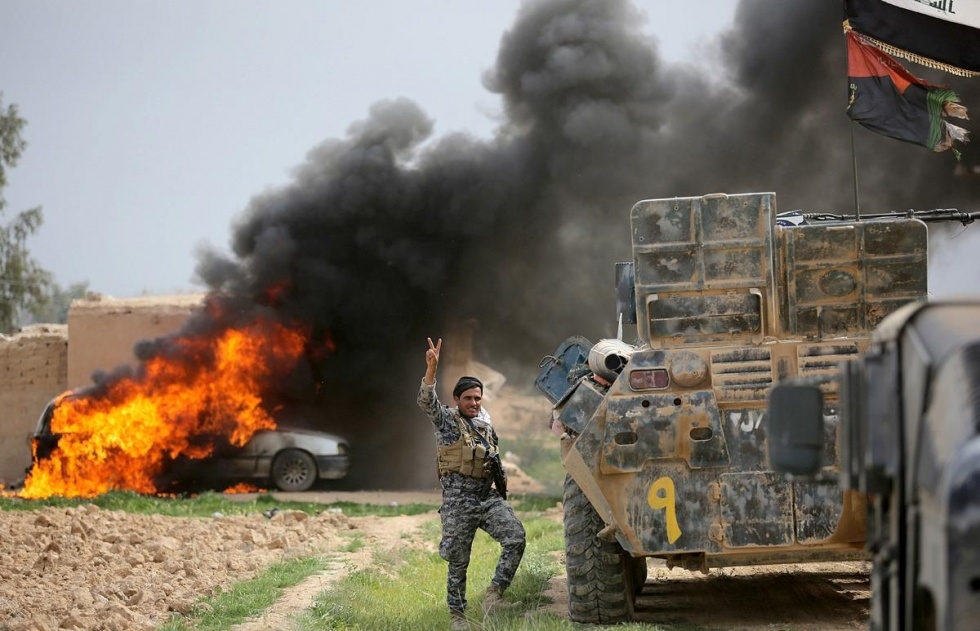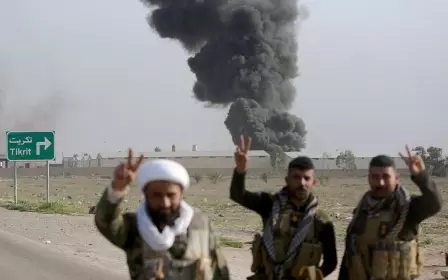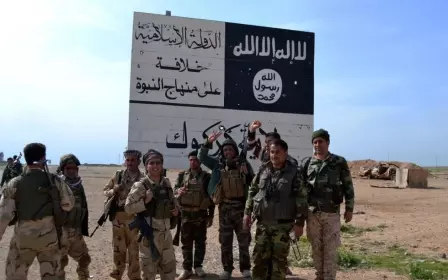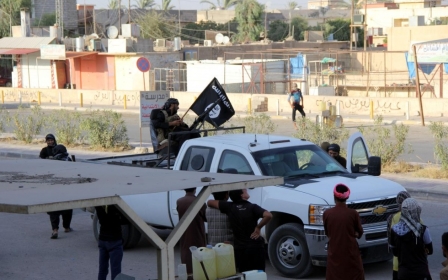Iraqi forces gain ground in Islamic State controlled areas

The Iraqi army and its allied Shiite forces either made significant military gains into areas held by the Islamic State, or managed to repel IS assaults, on Monday.
To the west, Ramadi - the capital of the troubled Anbar province some 90 kilometres west of Baghdad - was rocked in the early hours by seven suicide car attacks targeting army and security positions. The blasts, carried out by suspected Islamic State militants, appear to have been taking aim at the government-held areas of the city, which is otherwise largely held by IS.
However, government sources insist that the drive was quickly repelled.
"Our brave security forces were ready and had excellent intelligence about the operation," Anbar Governor Sohaib al-Rawi said on social media.
"What happened in Ramadi today is a clear victory for Anbar," he said.
Initial police and hospital reports said the number of people killed were 10, with 30 more injured, although the true toll might be higher with Anadolu Agency reporting that dozens of militants as well as two policemen could have been killed.
“At around 7 am (0400 GMT), IS launched seven attacks with suicide bombers driving Humvees in the areas of Hawz, Malaab, Toi, Albu Faraj and Albu Eitha,” said police major Mustafa Samir.
Pro-IS accounts on social media said a Belgian, a Syrian and a militant from the Caucasus were among the suicide bombers.
The government has been fighting off IS militants who control most neighbourhoods on the outskirts of Ramadi and regularly attack security forces in central districts for months.
Iraqi authorities have since imposed a curfew on Ramadi, with Anbar Governor Sohaib al-Rawi declaring today’s events as a “clear victory.”
The onslaught on the government-held centre of Ramadi coincides with Baghdad's push to retake the IS stronghold of Tikrit, about 160 kilometres (100 miles) north of Baghdad.
Pro-Baghdad forces consist of the Iraqi army, allied Shia forces, and the Popular Mobilisation units that are made up largely of volunteers. On Wednesday, after a 10-day long drive, authorities announced that they finally advanced into the heart of the northern city of Tikrit, the birthplace of former Iraqi president Saddam Hussein.
In recent days, the army have refrained from entering the city, focusing instead on taking control of several towns in the outskirts of Tikrit, including strategically key al-Alam and al-Dour.
But Tikrit’s northern Qadsiya district is now under the control of the army and militia fighters, marking one of the biggest counter-offensive to date.
An anonymous senior military source told AFP that government forces were fighting “to cleanse the neighbourhood of Qadisya”.
"We were able to control Tikrit military hospital, which is close to the centre of the city," the source said.
"But we are engaging in a very delicate battle because we are not facing fighters on the ground, we are facing booby-trapped terrain and sniper fire. Our movement is slow," they added.
A security official told Reuters that the ground forces were taking “one street every 30 minutes” as helicopters from the international coalition attacked IS snipers and positions. He added that there was fierce fighting around the Tikrit police headquarters south of Qadsiya.
The Iraqi allied forces or Hashid Shaabi (Popular Mobilisation), number 20,000 in the area and are backed by airstrikes from the US-led anti-IS coalition.
IS militants took over Tikrit last June after occupying parts of central and northern Iraq. The militants have since used a complex of palaces, built by toppled leader Saddam Hussein, as their headquarters.
The battle for Tikrit is seen as the precursor for the expected showdown between the Iraqi forces and the Islamic State’s stronghold of Mosul, the second largest city in Iraq.
Despite the recent gains by Baghdad-allied forces, most analysts believe that longer-term success can only come from bolstering Sunni tribal and other forces that are hostile to IS.
On Tuesday, coalition member Turkey, said that it would begin a training programme for local Sunni forces and the Iraq army in preparation for the Mosul offensive.
The Turks are already training 1,500 Kurdish fighters in northern Iraq known as the Peshmerga.
“We have decided to give train-equip, intelligence and logistics support to the Iraqi Army, the Peshmerga, and the Sunnis,” Turkey’s Defence Minister Ismet Yilmaz told reporters.
Yilmaz said that he is waiting for a decision from the Iraqi officials to set up a location for the military training programme, but said that Ankara is open to the idea of training Iraqis on Turkish soil.
On the other hand, the timing of the training programme for the Syrian opposition will be jointly decided by Turkey and the US, the minister added.
The Pentagon has recruited 1,200 individuals from different Syrian opposition groups to be part of the programme, which is due to begin in mid-March.
A 1,000 American troops are due to be deployed to Turkey to assist in training. Additionally, Saudi Arabia and Qatar are expected to start training the so-called moderate Syrian rebel fighters.
New MEE newsletter: Jerusalem Dispatch
Sign up to get the latest insights and analysis on Israel-Palestine, alongside Turkey Unpacked and other MEE newsletters
Middle East Eye delivers independent and unrivalled coverage and analysis of the Middle East, North Africa and beyond. To learn more about republishing this content and the associated fees, please fill out this form. More about MEE can be found here.




